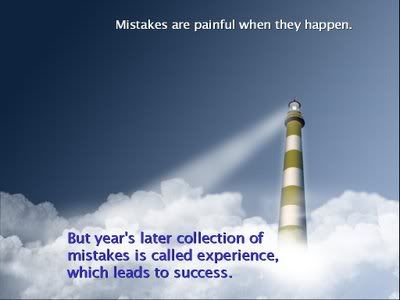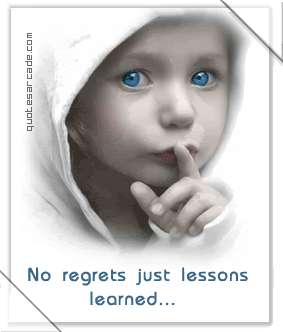
I Wish I Hadn't Done That!
By Peter Shepherd
We all do things we are not proud of, we wouldn't be human if we didn't. Something that affects others in a way that we would not be willing to experience ourselves. Sometimes we do something that we know at the time is wrong, but it seems like the best solution to our situation. Or maybe we are tempted to put our own interests first. Other times we may be carried away by emotions of anger or jealousy and do something out of spite we may later regret. Or we don't do something, like helping a friend in need, that we know we really should have. Alternatively we may have the best of intentions but things go wrong, we make a mistake or realize something we have done was harmful, even though we didn't mean it to be.
These sorts of actions can leave us feeling ashamed and depressed, and we can end up carrying our guilt for years, but if we want to live happy lives, we need to take responsibility for the consequences of our behavior and move on.
Feeling guilty should not be confused with taking responsibility for our past. Responsibility means that we make a concerted effort to change the behavior pattern that resulted in the wrong-doing, and the beliefs and feelings that empowered it. We need to move on by making peace with the past.
The natural tendency when we do something wrong is to try to justify our actions, to make ourselves right. Or we may say the action was not wrong, it was deserved, making the other person wrong. Both of these are avoiding the reality, by denying our own sense of right and wrong and our own responsibility for our actions. We avoid our feelings of guilt by pretending it was nothing wrong that we did, indeed it was right. We avoid our feelings of shame (feeling bad about how others perceive us) by pretending that it is the other who should be ashamed.
The problem is not the harmful action or making a mistake - that's happened and can't be undone. The problem is what we tell ourselves afterward. Whether we are honest or if we lie to ourselves. It is that lie which causes all the damage to our own integrity and to further relationships with the other we have wronged.
We need to drop our defenses, drop the lies we may have told ourselves to hide the truth, face up to the reality of our actions and their consequences - and forgive ourselves.
Their is a big bonus to being realistic and truthful - we can learn the valuable lesson that the experience offers us. Indeed, it's only when we have learned that lesson that we can let go of the past error and live our life as truly ourselves in the present.

So to forgive ourselves we need to learn the lesson. Let's look at mistakes first. Mistakes are an essential part of learning. When we learn to drive a car, we crunch the gears and go backward instead of forward. But we learn and get better. Later on we may cross a red light and get stopped by the police and fined. Again, we can learn from that, to take more care when approaching crossroads. We then become a better driver. The next time you make a mistake say to yourself, "That's cool, so what can I learn from this?" Instead of feeling grotty you will feel challenged and motivated.
But what if I had crossed the red light, run into a car and injured the driver badly. That's not cool. I can say that it had only just changed to red so I didn't really do anything wrong. I can blame the other driver for not checking anyone was still crossing before they moved off. Or I can accept it was a foolish action, a combination of a mistake but also recklessness. I was wrong, I did it. I'm sorry.
But real forgiveness has nothing to do with feeling sorry or apologizing, neither of which actually changes anything. Neither can forgiveness be given by another; it has to be granted by ourselves. Unless we can truly forgive ourselves, we can never really move on and be free of the past.

What gets in the way of this forgiveness is judgment, that I am a bad person. I need to separate my inherent worth from the wrong-doing. I am basically a loving being, I know that. We all are. Actually I am not even my thoughts and feelings. I create these and sometimes through ignorance or misguidedly I create them inappropriately, and my consequent actions can result in hurt for others. Then the best I can do is to learn from that so in future I can create more truly to my nature.
I need to realize that the wrong-doing was a result of my ignorance - I did not know what I can now see to be the lesson from the experience. I just wanted to get to my destination quickly, I didn't think about the possible outcomes that could result from driving irresponsibly, I thought it was OK to cross a red light. So my basic motive wasn't bad but I was operating on false information, I was misguided.
We can't move on if we regret the past, nor if we have contempt for our selves. To feel like this implies that we view our past as meaningless and of no value, and our selves as no longer to be trusted. On the contrary, forgiving ourselves requires finding value in our experiences and in our selves. Instead of just writing off an experience as a painful episode and trying to forget it, we should try to learn from it whatever we can.
Life is a journey of learning and the most worthwhile learning is derived from our personal experiences. When things go right, because we have good information and appropriate beliefs, then our learning is reinforced by this positive feedback. When things go wrong, because we have faulty information and inappropriate beliefs, then we and those at the effect of our actions suffer. But here we have a chance to learn something new. Much of our new learning and personal growth does therefore come about as a result painful experiences; provided we are willing and open to learn those lessons.
If we wish to grow and to use our experiences beneficially, it is vital that we focus on what we can learn, rather than to resist the reality of what occurred.
Find something you did (or failed to do) that you still feel bad about, that you regret, that makes you feel ashamed. Now begin to take meaning and value out of this experience. Ask yourself: "What has this taught me - about myself, about others and about my life?" Based on this lesson, work out what beliefs you need to change, what fixed ideas you can let go of, what assumptions you made that are no longer helpful.
Self-forgiveness recaptures the energy that you were giving away in guilt and resistance against the past. It frees you to be yourself again - a new, happier and wiser you.
Infinite LoVe & HaPPiness to ALL:
♥Stassy♥Love♥


~♥ Love Guides~Fear Divides ♥~
~♥ Love Guides~Anger Divides ♥~
~♥ Love Guides~Hatred Divides♥~
~♥Love is The Key ♥ Be the Key ♥~
Comments
Post a Comment